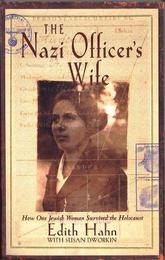
|
The Nazi Officer's Wife: How one Jewish woman survived the holocaust
Paperback / softback
Main Details
| Title |
The Nazi Officer's Wife: How one Jewish woman survived the holocaust
|
| Authors and Contributors |
By (author) Edith Hahn Beer
|
|
By (author) Susan Dworkin
|
| Physical Properties |
| Format:Paperback / softback | | Pages:320 | | Dimensions(mm): Height 196,Width 128 |
|
| Category/Genre | Biographies:General
The Holocaust |
|---|
| ISBN/Barcode |
9780349113791
|
| Classifications | Dewey:940.5318092 |
|---|
| Audience | |
|---|
| Illustrations |
Section: 16, B&W
|
|
Publishing Details |
| Publisher |
Little, Brown Book Group
|
| Imprint |
Abacus
|
| Publication Date |
1 March 2001 |
| Publication Country |
United Kingdom
|
Description
Edith Hahn was an outspoken young woman studying law in Vienna when the Gestapo forced her and her mother into a ghetto, issuing them papers branded with a "J". Soon Edith was taken away to a labour camp and when she returned home after months away she found her mother had been deported. Her boyfriend, Pepi, proved too terrified to help her, but a Christian friend was not. Using the woman's identity papers, she fled to Munich. There she met Werner Vetter, a Nazi party member who fell in love with her and, despite her protests and even her eventual confession that she was Jewish, he married her and kept her identity secret. In this account, Edith recalls a life of constant, almost paralyzing fear. She tells of German officials who casually questioned the lineage of her parents; of how when giving birth to her daughter, she refused all painkillers, afraid that in an altered state of mind she might reveal something of her past; and of how, after her husband was captured by the Russian Army and sent to Siberia, Edith was bombed out of her house and had to hide at night with her daughter in a closet while drunken Russian soldiers raped women in the streets.
Author Biography
see above
Reviews'Hahn Beer tells her story with a remarkable lack of rancour ... her evocation of atmosphere and detail is worthy of John le Carre. The book is most moving as a record of individual courage but it also constitutes valuable evidence on the vexed subject of how far ordinary Germans were aware of the evil in their midst' THE TIMES 'All memoirs of this period are worthwhile, but, in this case, doubly so.' MORNING STAR
|